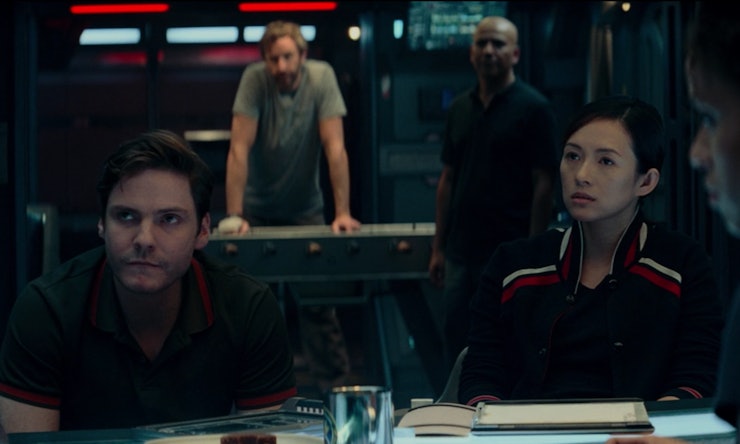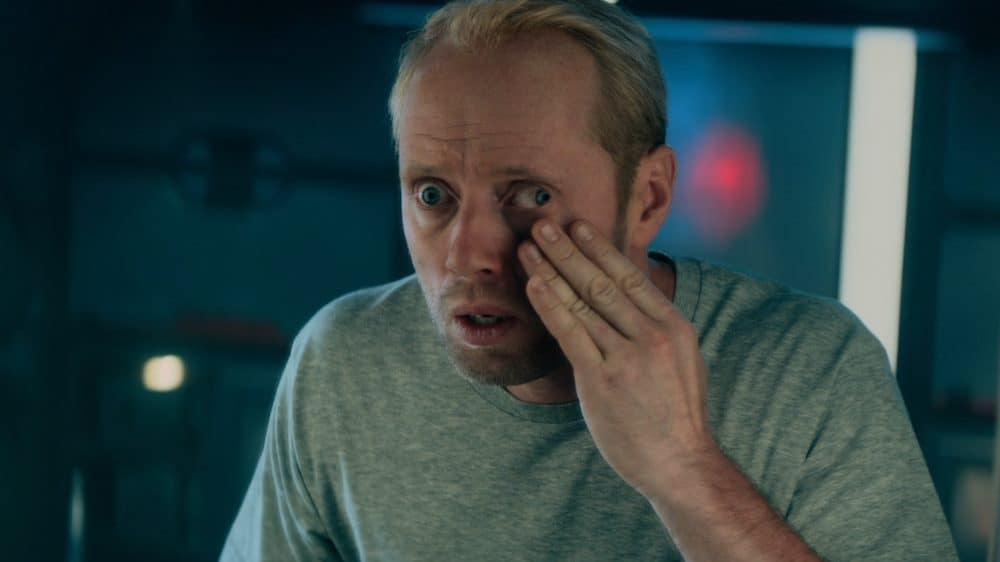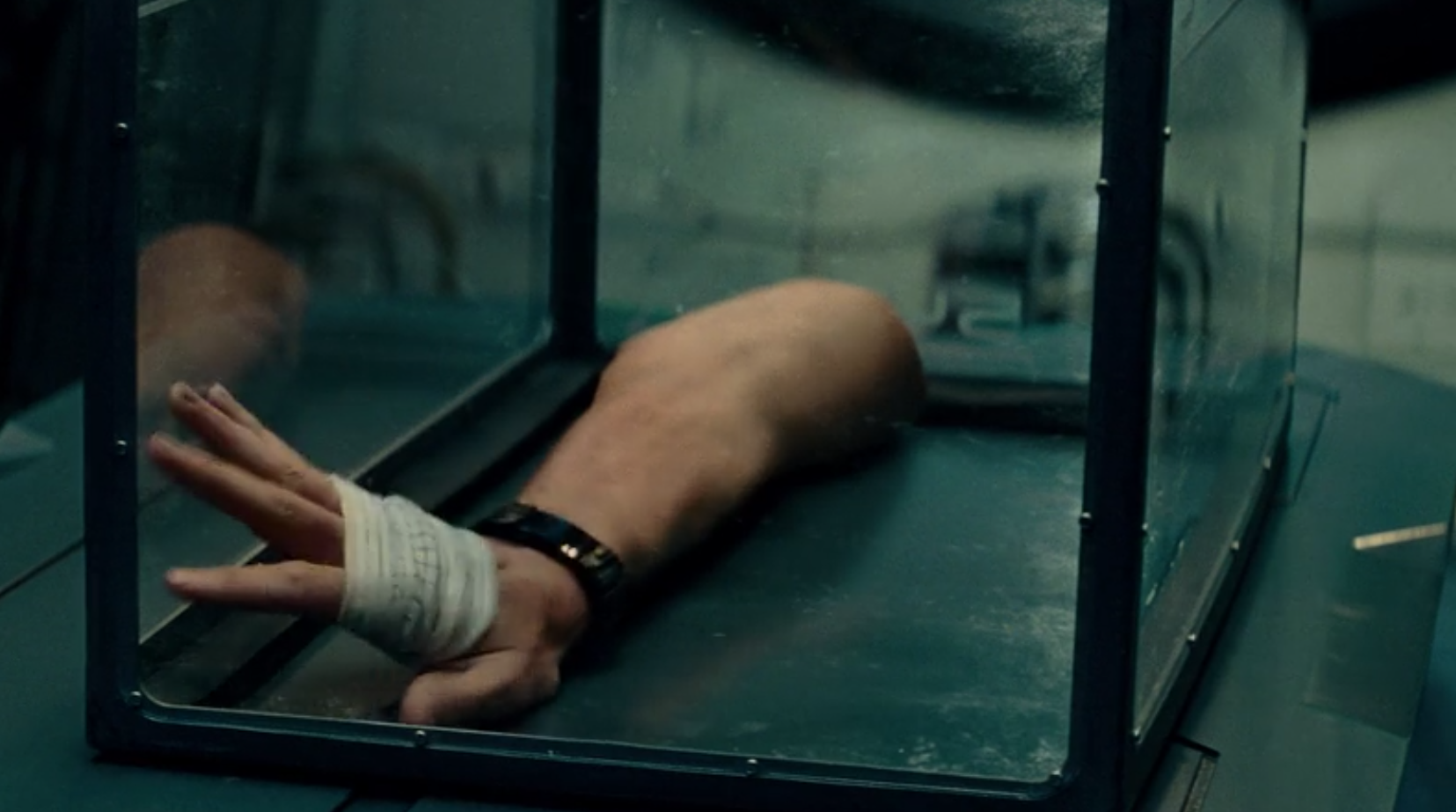An astonishingly wasted chance to revitalise space horror
 |
| "Can we please have a new script now? I was in bloody House of Flying Daggers, you know" |
Some Netflix viewing experiences require the 15 second rewind button : ‘What did they say?’, or, ‘Woah, what was that?!’, or perhaps, ‘Oh that’s beautiful, let me see it again!’ Some, however, make you wish there was a skip-forward option instead : ‘Urgh, this is boring’, or, ‘Yikes, this is too gruesome’. A rare few, like The Cloverfield Paradox, make you want to do both. There are moments so amusingly-misguided or off-key that they invoke an urge to go back and check you didn’t mishear, like a third of the dialogue. On the other hand, there are twice as many points in the ‘narrative’ that inspire a desperate desire to skip ahead, like the tedious renditions of the age-old (and age-weary) ‘lone person walks slowly and nervously towards something no sane person would as the music screams at you how to feel’ device, or the repeated cuts after a violent or dramatic incident to wide exterior shot then moody silent shots of cast looking moody for ages before anything else happens.
The fact that this entire film is entirely made of sections of either skip-aheads or ‘wait, did they just commit that to the screen on purpose?!’ tells you all you need to really know about whether to see this. Yet the reason this review and indeed the reasons for my viewing The Cloverfield Paradox in the first place exist bears some scrutiny in relation to this new age of streaming commissions taking over from traditional channels of creation, coming at a time of renewed (and profitable) proliferation of Science Fiction and Fantasy filmmaking. Arguably at no time since the late 1950s have sci-fi dramas been so numerous in cinema and television. Yet so few do more than ape their forebears. And here comes what is essentially a crap B-movie Event Horizon with a bit of Alien and Sunshine thrown in, the sort of shameless rip-off film you see littering Netflix’s homepage once you get past the fifty or so decent movies. Yet it has been showered with attention because of the Cloverfield element, which has garnered it a decent budget and cast. Sadly, a decent story wasn’t necessary for this cynical business construct to be given life. I won’t go into the Cloverfield factor of this, for a few reasons. Firstly, so many others already have. Secondly, it feels so weakly connected that it might as well have been called the Battleship Paradox, or the Predator Paradox. Thirdly, the previous two films don’t deserve to be sullied by association. Suffice to say though that the sense of helpless dread the first two films created through artistry is barely touched on here in the poorly-depicted hints of [spoiler alert] ...... apocalypse on Earth.
The fact that this entire film is entirely made of sections of either skip-aheads or ‘wait, did they just commit that to the screen on purpose?!’ tells you all you need to really know about whether to see this. Yet the reason this review and indeed the reasons for my viewing The Cloverfield Paradox in the first place exist bears some scrutiny in relation to this new age of streaming commissions taking over from traditional channels of creation, coming at a time of renewed (and profitable) proliferation of Science Fiction and Fantasy filmmaking. Arguably at no time since the late 1950s have sci-fi dramas been so numerous in cinema and television. Yet so few do more than ape their forebears. And here comes what is essentially a crap B-movie Event Horizon with a bit of Alien and Sunshine thrown in, the sort of shameless rip-off film you see littering Netflix’s homepage once you get past the fifty or so decent movies. Yet it has been showered with attention because of the Cloverfield element, which has garnered it a decent budget and cast. Sadly, a decent story wasn’t necessary for this cynical business construct to be given life. I won’t go into the Cloverfield factor of this, for a few reasons. Firstly, so many others already have. Secondly, it feels so weakly connected that it might as well have been called the Battleship Paradox, or the Predator Paradox. Thirdly, the previous two films don’t deserve to be sullied by association. Suffice to say though that the sense of helpless dread the first two films created through artistry is barely touched on here in the poorly-depicted hints of [spoiler alert] ...... apocalypse on Earth.
What remains then is a creation that feels like a commercial construction rather than a story. The cast are almost all lost, as if all required to be there against their will, like a shit theatre workshop retreat in space. When glimmers of personality surface, they glare awkwardly in the dim light of both the set and the script. The best example of this is Chris O’Dowd, clearly brought in to bring some wise-cracking light relief but despite his natural talents and charm failed to make me more than smile once or twice, and his ‘humorous’ lines and deployment as light relief agent jar terribly with the seriousness of the situation. Two spoilers as examples- fellow crew member for last two years dies in explosion of worms (don’t bloody ask) and he says, “So that’s where the worms went”. If he was in a broad comedy-horror (which actually would have been great), fine; here, it kills any tiny fragments of sympathy or connection we might have with the poorly-drawn characters. He later loses an arm in the most ridiculous way and the attempt to make a running gag of this drains the meagre resources of tension the plot thus far had managed to conjure, and kills the fear of bad things happening to other crew by how random and unbelievably daft it is. At least Event Horizon knew to play its body-horror madness straight. At no point does the threat of the random and deadly accidents, which result in the horror and befall most of the crew, achieve any sense of causality beyond the idea of two dimensions overlapping.
The rest of the cast are, bluntly, wasted or badly miscast. A couple retain dignity solely by not having to say more than a handful of lines, but some are simply not up to the challenge, and sadly the lead is chief among them. Gugu M'Batha-Raw fills almost all her moments with a singular emotion of fearful worry and despite being our lead-in to the crew, seems to have little connection to any of them in the dialogue and so is left in the background and it took me a while to clock what her role actually was. In fact, one of the worst elements is the poor interaction between the cast which suggest they were dumped on set in as sudden a manner as their characters are dumped far from home. A few merciful moments of genuine human connection, mainly told through the eyes of some of the underused actors, like Daniel Bruhl and David Oyelowo, only serve to hint at what could have been. As for the filmmaking, the cinematography is fairly bland and the sound design often awful, especially the use of Bear McCreary’s overly-wrought big, traditional orchestral score, which strikes the wrong tone regularly, especially in action scenes. Music can be the wings of a films as Zimmer said; here, it is the concrete boots.
Finally, it is vital that those reading this don’t fall into the trap of thinking it’ll be a mindless fun genre thrill. This film is actively bad. It is frustratingly poor storytelling that is a stain on the already fairly tarnished sub-genre of space horror and undeserving of the attention and resources it has. As for that much-discussed final ‘shock’ shot - I would have laughed out loud at how shoddy it is if my spirits weren’t already brought so low by the dire final act of inexplicable murder and resolution-through-fighting nonsense that preceded it. If you want to show (spoiler....) the world taken over by monsters, meanwhile, you need more effort than one guy looking worried and texting whilsts saving a random kid, and a final shot that makes your viewer think of the Jaws gag from Airplane. JJ Abrams and co had better find a seriously great script and a much better director for their next instalment.
 |
| You won't be able to un-see this film but at least you'll forget it almost immediately |
Baseline Assessment : 4/10
Bonuses : +1 for... well... I finished it. It certainly enthralls you in the hope it'll sort itself out, like watching a drunk trying to do up their shoelaces.
Penalties : -1 for showing you actors you love do... nothing; -1 for the rubbish 'oh ok one person will suddenly decide to kill everyone' device; -1 for never once scaring me
Nerd Coefficient : 2/10 which is "really, really bad" on our scoring system
Written by English Scribbler, space horror obsessive and NOAFFT contributor since 2013
